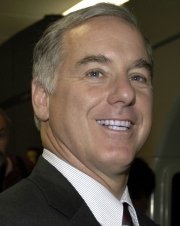 By Gov. Howard Dean, M.D. August 31, 2004
And yet as a nation, we spend a little over half as much per person on health care for this group of Americans than we do on the rest of us. The media often reports on local conflicts over American Indian gaming, but they rarely report on the reality that Native Americans are second-class citizens when it comes to allocating health resources. If any other minority group in America were systematically receiving half the health resources that everyone else in the nation gets, there would be a justifiable cry of racism. What America is doing in the area of Indian health care is plain wrong and this nation is too strong to continue to do this. Indian Health Service facilities are often substandard and the U.S. Civil Rights Commission has called the systematic under funding of this system a "quiet crisis." Yet, the price tag to bring the Native American population up to equal funding is about what we spend in Iraq in one month. Of course, more health care funding is not the only solution to this crisis. A stronger economy across the board in Indian country is key to improving overall health factors. We must fund education in Indian country with an eye toward stimulating long-term opportunity. Instead of sending our jobs overseas, we ought to keep some of them for our own people, particularly in the rural areas where Native Americans are finding it increasingly difficult to find work that pays a living wage, or even to get a job at all. We also need to improve retention of medical professionals in Indian country. Since people who are recruited from their home areas are more likely to return home to practice, it is important to improve recruitment and support for young Native Americans to go to college and pursue medical school and nursing. We need to fund adequate incentives for health care professionals, in exchange for practicing in underserved areas all over America - including Indian country. The best hope for increased national attention to the concerns facing American Indian and Alaska Native people is the political awakening going on in Indian country all over America. In the last few election cycles, numerous candidates have been elected with help from the Native American vote. Two United States senators, Tim Johnson of South Dakota and Maria Cantwell of Washington, can thank Native Americans for providing the key votes it took to carry them to victory. And Kalyn Free, a Choctaw from Oklahoma, narrowly lost a primary for U.S. House of Representatives in a solid Democratic district to the son of a well-known politician. This fall, American Indians
in South Dakota will make the difference in the biggest Senate
race of all - the re-election of Senate Minority Leader Tom Daschle.
If he wins, and if Democrats succeed in retaking control of the
White House, it is time for both Daschle and the Democrats to
deliver real health equity to Native Americans everywhere. howarddean@democracyforamerica.com Howard Dean, M.D. and former governor of Vermont, is the founder of Democracy for America, a grassroots organization that supports socially progressive and fiscally responsible political candidates. All Rights Reserved. Distributed exclusively by Cagle, Inc. www.caglecartoons.com to subscribers for publication.
|
||
